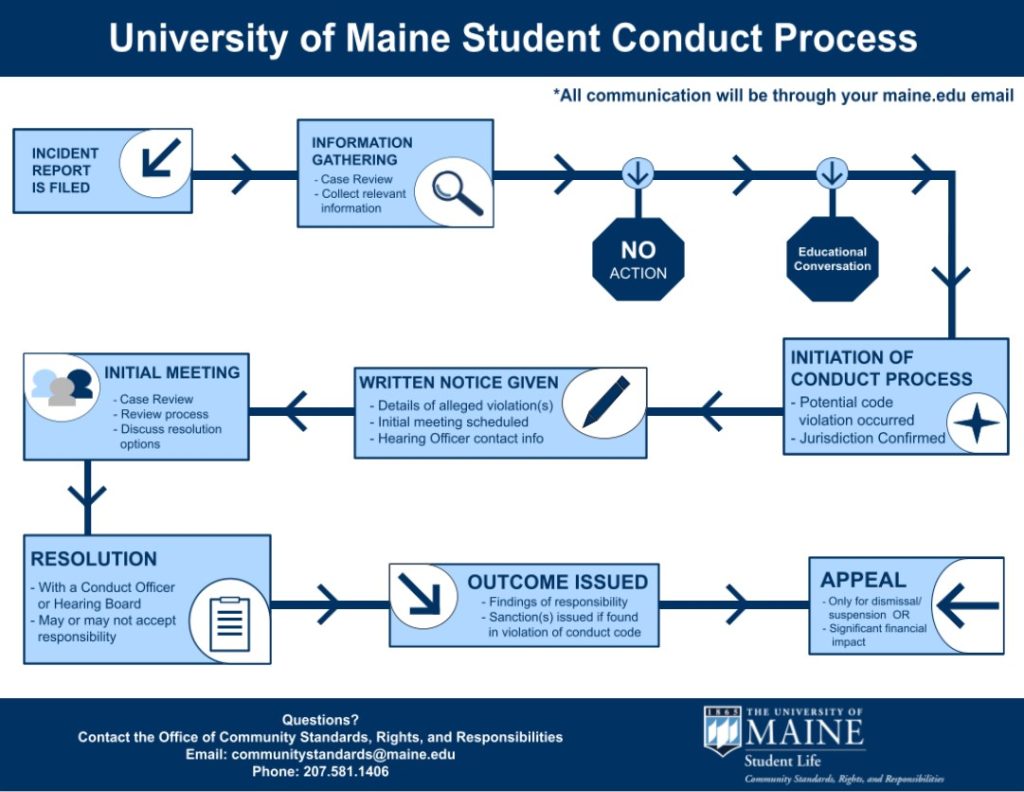Student Conduct Process
The University of Maine Student Conduct Process is designed to be fair and impartial to all students. The University of Maine follows the process outlined in the Student Code of Conduct. The steps below outline what happens during the process with a flowchart below.
If a student is found in violation of the student conduct code the case and all associated materials will be kept in the students educational record for up to seven years after the student leaves the university. If a student is not found to be in violation of the student conduct code then all associated materials will not be kept in the students educational record.

Incident Report is Filed: An incident report is a documentation of an alleged violation to the Student Code of Conduct filed with the Office of Community Standards, Rights, and Responsibilities.
Information Gathering: The incident report is reviewed to see if further action is required, and if so, what information is needed.
No Action: If, during the information gathering phase, it is determined that no violation of the code occurred the incident report will be closed with no action taken.
Educational Conversation: If, during the information gathering phase, it is determined that a violation or disruptive behavior not rising to the level of the conduct process may have occurred the student will have an educational meeting with a staff member of the Division of Student Life.
Initiation of Conduct Process: During the information gathering phase it was determined a potential violation of the student conduct code occurred. The incident report will be turned into a case and assigned to a University Hearing Officer.
Written Notice Given: After a case is assigned to a Hearing Officer a date and time will be set for the initial meeting. All notices and communication will be sent via email to a students @maine.edu email account.
Initial Meeting: An administrative meeting before a Hearing Officer to determine whether or not a violation to the Code of Conduct occurred.
Formal or Alternative Resolution: There are two ways a case may be resolved through the conduct process: a formal resolution or an informal resolution.
Formal Resolution: A formal resolution may be used for more higher level conduct violations. This process may or may not use a Hearing Officer or Hearing Board, depending on the staffing needs and components of each case individually.
Alternative Resolution: An alternative resolution may be used for lower level conduct violations and involves the alleged student and a Hearing Officer. In most cases, the initial meeting serves as the hearing for an alternative resolution.
Outcome Issued: After the conclusion of the formal or alternative process an outcome is issued to the student via their @maine.edu email account. If a student is found in violation of the student conduct code there will be sanctions issued in the outcome letter.
Appeal: If a student is found in violation of the student conduct code they have the right to appeal the decision within 7 calendar days of the outcome letter being emailed. All request for appeal must be submitted through the Appeals Form. Appeals will only be granted if the sanction(s) applied include dismissal, suspension, or the student incurs a significant financial impact. Appeals have two levels in the student conduct process:
Student Conduct Appeal Panel: The Appeal Panel is the first level of appeal in the student conduct process. A review by a panel of at least three (3) people based on procedural error, consideration of new evidence, and inappropriate sanctioning.
Presidential Review: The presidential review is the second and final review phase of the student conduct process. A presidential review consists of an individual or panel appointed by the Campus President or their designee that reviews cases on the basis of procedural error, consideration of new evidence, and inappropriate sanctioning. This level of review is available only to students who have been suspended, dismissed, incurred a significant financial impact, or are an involved party in a Title IX case.
Case Closed: If a student does not file for an appeal then the case is closed. Once the appeals process concludes the case is closed.
